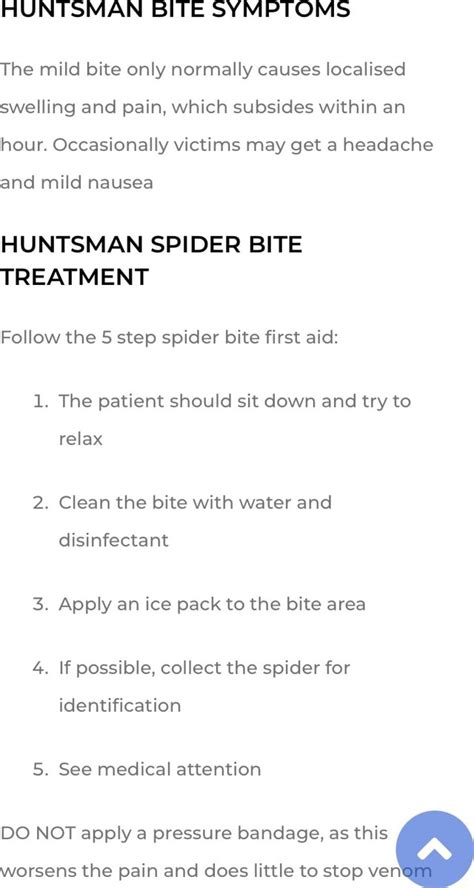Have you ever been bitten by a spider and worried about the consequences? Spider bites can be a cause for concern, especially if you're unsure of the type of spider involved. In this article, we'll focus on the Huntsman spider, a large and speedy arachnid found in many parts of the world. We'll explore the symptoms and treatment options for Huntsman spider bites, so you can rest assured if you're ever faced with this situation.
Huntsman spiders are known for their impressive leg span, which can reach up to 12 inches in diameter. Despite their intimidating size, Huntsman spiders are generally harmless to humans and tend to avoid confrontations. However, if they feel threatened or cornered, they may bite in self-defense.
Symptoms of Huntsman Spider Bites
If you're bitten by a Huntsman spider, you may experience some of the following symptoms:

- Pain: Huntsman spider bites can be painful, but the pain is usually mild and temporary. You may experience a sharp, stinging sensation at the bite site.
- Redness and Swelling: The affected area may become red, swollen, and inflamed. This is a normal response to the spider's venom.
- Itching: Some people may experience itching or a burning sensation at the bite site.
- Blisters: In rare cases, a Huntsman spider bite may cause blisters or lesions to form.
Treatment for Huntsman Spider Bites
Fortunately, Huntsman spider bites are not typically serious and can be treated with minor first aid. Here are some steps to follow:
First Aid
- Clean the Bite: Wash the affected area with soap and water to prevent infection.
- Apply a Cold Compress: A cold compress or an ice pack can help reduce pain and swelling.
- Elevate the Affected Area: If the bite occurs on an arm or leg, elevate it above the level of your heart to reduce swelling.
Home Remedies
- Baking Soda: Mix baking soda with water to create a paste, and apply it to the affected area to help neutralize the venom.
- Aloe Vera: Aloe vera gel can help soothe the skin and reduce inflammation.
- Tea Tree Oil: Tea tree oil has antiseptic properties that can help prevent infection.
Medical Attention
If you experience any of the following symptoms, seek medical attention immediately:
- Severe Pain: If the pain is severe or persistent.
- Increased Swelling: If the swelling spreads beyond the affected area.
- Difficulty Breathing: If you experience difficulty breathing or swallowing.
- Fever: If you develop a fever or chills.
Prevention is the Best Cure
While Huntsman spider bites are generally harmless, it's still important to take precautions to avoid them. Here are some tips:
- Wear Protective Clothing: Wear long sleeves, pants, and gloves when working in areas where Huntsman spiders are common.
- Seal Entry Points: Seal any cracks or crevices around your home to prevent Huntsman spiders from entering.
- Keep Your Home Clean: Regularly vacuum and dust your home to reduce the likelihood of encountering a Huntsman spider.




Conclusion
Huntsman spider bites are generally harmless and can be treated with minor first aid. By understanding the symptoms and treatment options, you can rest assured if you're ever faced with this situation. Remember to take precautions to avoid Huntsman spider bites, and seek medical attention if you experience any severe symptoms.
Frequently Asked Questions
What do Huntsman spider bites look like?
+Huntsman spider bites can cause redness, swelling, and itching at the affected area.
Are Huntsman spider bites poisonous?
+Huntsman spider bites are not typically poisonous and are generally harmless to humans.
How long do Huntsman spider bites take to heal?
+Huntsman spider bites usually heal on their own within a few days.
